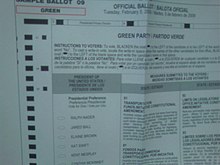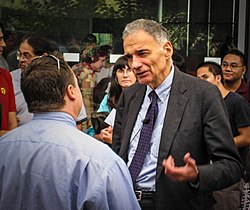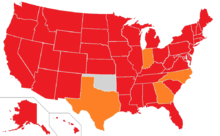
Ralph Nader is an American political activist, author, lecturer, and attorney noted for his involvement in consumer protection, environmentalism, and government reform causes, and for being a perennial presidential candidate. He became famous in the 1960s and 1970s for his book Unsafe at Any Speed, which criticized the automotive industry for its safety record and helped lead to the passage of the National Traffic and Motor Vehicle Safety Act in 1966.

The Peace and Freedom Party (PFP) is a left-wing political party with ballot status in California. Its first candidates appeared on the 1966 New York ballot. The Peace and Freedom Party of California was organized in early 1967, gathering over 103,000 registrants which qualified its ballot status in January 1968 under the California Secretary of State Report of Registration.

The Reform Party of the United States of America (RPUSA), generally known as the Reform Party USA or the Reform Party, is a centrist political party in the United States, founded in 1995 by Ross Perot.

Peter Miguel Camejo Guanche was a Venezuelan American author, activist, politician and Sailing Olympian. In the 2004 United States presidential election, he was selected by independent candidate Ralph Nader as his vice-presidential running mate on a ticket which had the endorsement of the Reform Party.

The 2008 United States presidential election was the 56th quadrennial presidential election, held on Tuesday, November 4, 2008. The Democratic ticket of Barack Obama, the junior senator from Illinois, and Joe Biden, the senior senator from Delaware, defeated the Republican ticket of John McCain, the senior senator from Arizona, and Sarah Palin, the governor of Alaska. Obama became the first African American to be elected to the presidency, as well as being only the third sitting United States senator elected president, joining Warren G. Harding and John F. Kennedy. Meanwhile, this was only the second successful all-senator ticket since the 1960 election and is the only election where both major party nominees were sitting senators. This was the first election since 1952 in which neither the incumbent president nor vice president was on the ballot, as well as the first election since 1928 in which neither ran for the nomination.
This is a timeline of events during the 2004 U.S. presidential election.

The 2004 presidential campaign of Ralph Nader, political activist, author, lecturer and attorney began on February 23, 2004. This was Nader's third presidential campaign, having run in 1996 and 2000 campaign as the candidate for the Green Party; in 2004 he ran as an independent candidate. Nader won the 2002 endorsement of the Reform Party USA, and thus appeared on the ballot as the Reform Party candidate in several states. In some states, Nader was on the ballot as an independent candidate, while in other states, Nader was deemed not to have met the requirements for ballot access.
The Green Party of the United States originated in 1984 when 62 people from the U.S. gathered in St. Paul, Minnesota and founded the first national Green organization - the Committees of Correspondence. The Green Party of the U.S. has gone through several evolutions, from debating theory and praxis in the 1980s, to starting state parties in the 1990s, to the founding of a national political party in the 2000s.
The following is a timeline of major events leading up to and immediately following the United States presidential election of 2008. The election was the 56th quadrennial United States presidential election. It was held on November 4, 2008, but its significant events and background date back to about 2002. The Democratic Party nominee, Senator Barack Obama of Illinois, defeated the Republican Party's nominee, Senator John McCain of Arizona.

The Green Party of Arkansas is the state party organization for Arkansas of the Green Party of the United States.
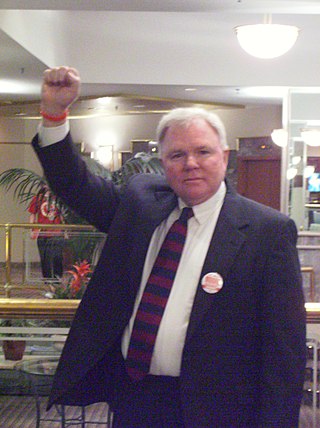
Brian Patrick Moore is an American politician and founder of antiwar organization Nature Coast Coalition for Peace & Justice. A perennial candidate, he was the presidential nominee of the Socialist Party USA for the 2008 United States presidential election; he waged several campaigns for mayor and city council in Washington, D.C., and twice ran for the United States House of Representatives from Florida's 5th congressional district, winning none; he ran for the Democratic Party nomination for Governor of Florida in 2010, but lost in the primary election.
The 1996 presidential campaign of Ralph Nader, consumer advocate and political activist, began after he was drafted as a candidate for President of the United States on the Green Party ticket during the 1996 presidential election. Nader was not formally nominated by the national party or the Green Party USA organization, which was, at the time, the largest national Green group; instead he was nominated independently by various state Green parties. In some states, he appeared on the ballot as an independent.

The 2000 presidential campaign of Ralph Nader, political activist, author, lecturer and attorney, began on February 21, 2000. He cited "a crisis of democracy" as motivation to run. He ran in the 2000 United States presidential election as the nominee of the Green Party. He was also nominated by the Vermont Progressive Party and the United Citizens Party of South Carolina. The campaign marked Nader's second presidential bid as the Green nominee, and his third overall, having run as a write-in campaign in 1992 and a passive campaign on the Green ballot line in 1996.
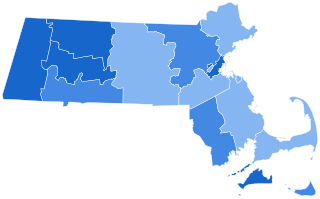
The 2008 United States presidential election in Massachusetts took place, as in all 50 states and D.C., as part of the 2008 United States presidential election of November 4, 2008. Voters chose 12 representatives, or electors to the Electoral College, who, in turn, voted for the office of president and vice president.

The 2008 presidential campaign of Bob Barr, former Congressman of Georgia began on May 12, 2008. He announced his candidacy for the Libertarian Party's president after months of grassroots draft efforts. Barr was criticized by Libertarians who opposed his efforts in Congress, which included sponsorship of the Defense of Marriage Act and votes in favor of the USA PATRIOT Act and authorization of the War in Iraq, but he was supported by others who accepted his regret for those positions. Barr won the party's nomination after six rounds of balloting at the 2008 Libertarian Party National Convention. Former contender Wayne Allyn Root was named as his running mate. Reason magazine senior editor Radley Balko called Barr "the first serious candidate the LP has run since I've been eligible to vote."
This article compares the presidential candidates in the United States' 2008 presidential election. It does not cover previous elections. Because of ballot access restrictions in the United States, not all candidates appeared on the ballots in all states.

The 2008 United States presidential election in Wisconsin took place on November 4, 2008, as part of the 2008 United States presidential election in which all 50 states plus the District of Columbia participated. State voters chose 10 electors to represent them in the Electoral College via a popular vote pitting Democratic U.S. Senator from Illinois Barack Obama, and his running mate U.S. Senator from Delaware Joe Biden, against Republican challenger and U.S. Senator from Arizona John McCain and his running mate, Alaska Governor Sarah Palin.
The 2008 presidential campaign of Brian Patrick Moore, a local activist from Florida, began when he announced his candidacy for the presidency of the United States in St. Louis, Missouri, on October 19, 2007. The same month he was declared the nominee of the Socialist Party USA for the 2008 presidential election. The SPUSA national convention elected Stewart Alexis Alexander of California as Moore's vice presidential nominee.

Christina Tobin is an American activist and leader in the election reform and voters' rights movements. She is the founder and chair of The Free & Equal Elections Foundation, and president and chief executive officer of Free and Equal, Inc.

